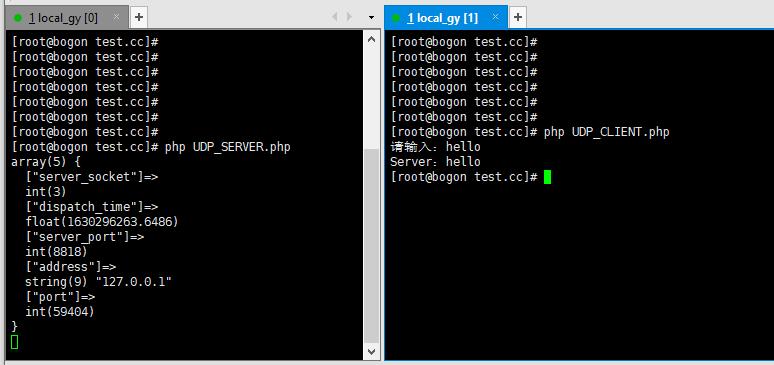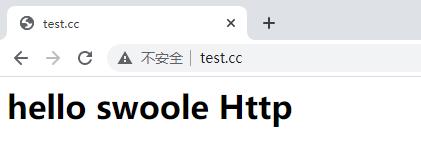swoole TCPUDPHTTP使用实例
Posted wgchen~
tags:
篇首语:本文由小常识网(cha138.com)小编为大家整理,主要介绍了swoole TCPUDPHTTP使用实例相关的知识,希望对你有一定的参考价值。
TCP
TCP_SERVER.php
<?php
class TCP{
private $server = null;
public function __construct(){
//创建Server对象,监听 127.0.0.1:9501 端口
$this->server = new Swoole\\Server('127.0.0.1', 8818);
$this->server->set([
'worker_num' => 4, // worker process num
'max_request' => 50,
]);
//监听连接进入事件
$this->server->on('Connect', [$this, "onConnect"]);
//监听数据接收事件
$this->server->on('Receive', [$this, "onReceive"]);
//监听连接关闭事件
$this->server->on('Close', [$this, "onClose"]);
//启动服务器
$this->server->start();
}
public function onConnect($server, $fd){
echo "客户端id:{$fd}.\\n";
}
public function onReceive($server, $fd, $reactor_id, $data){
$server->send($fd, "发送数据: {$data}");
}
public function onClose($server, $fd){
echo "客户端id: {$fd}关闭.\\n";
}
}
new TCP();
TCP_CUSTOMER.php
<?php
$scheduler = new Swoole\\Coroutine\\Scheduler;
$scheduler->add(function () {
$client = new Swoole\\Coroutine\\Client(SWOOLE_SOCK_TCP);
if (!$client->connect('127.0.0.1', 8818, 0.5))
{
echo "connect failed. Error: {$client->errCode}\\n";
}
fwrite(STDOUT, "请输入:");
$res = fgets(STDIN);
$client->send($res);
echo $client->recv();
$client->close();
});
$scheduler->start();

UDP
UDP_SERVER.php
<?php
class UDP{
private $server = null;
public function __construct(){
//创建Server对象,监听 127.0.0.1:9501 端口
$this->server = new Swoole\\Server('127.0.0.1', 8818, SWOOLE_PROCESS, SWOOLE_SOCK_UDP);
$this->server->set([
'worker_num' => 4, // worker process num
'max_request' => 50,
]);
//监听连接进入事件
$this->server->on('Packet', [$this, "onPacket"]);
//启动服务器
$this->server->start();
}
public function onPacket($server, $data, $clientInfo){
$server->sendto($clientInfo['address'], $clientInfo['port'], "Server:{$data}");
var_dump($clientInfo);
}
}
new UDP();
UDP_CLIENT.php
<?php
$scheduler = new Swoole\\Coroutine\\Scheduler;
$scheduler->add(function () {
$client = new Swoole\\Coroutine\\Client(SWOOLE_SOCK_UDP);
if (!$client->connect('127.0.0.1', 8818, 0.5))
{
echo "connect failed. Error: {$client->errCode}\\n";
}
fwrite(STDOUT, "请输入:");
$res = fgets(STDIN);
$client->send($res);
echo $client->recv();
$client->close();
});
$scheduler->start();

HTTP
HTTP.php
<?php
class HTTP{
private $http = null;
public function __construct(){
$this->http = new Swoole\\Http\\Server('0.0.0.0', 9501);
//配置访问目录
//$this->http->set([
// 'enable_static_handler' => true,
// 'document_root' => '/www/wwwroot/swoole_test/static',
//]);
$this->http->on('Request', [$this, 'onRequest']);
$this->http->start();
}
public function onRequest($request, $response){
var_dump($request->get, $request->post);
$response->header('Content-Type', 'text/html; charset=utf-8');
$response->end('<h1>Hello Swoole. #' . json_encode($request->get) . '</h1>');
}
}
new HTTP();
运行


还可以带一些参数

指定访问html目录,
(1) 开启前端代码的配置信息
$this->http->set([
'enable_static_handler' => true,
'document_root' => '/www/wwwroot/swoole_test/static',
]);
(2) 新增static/index.html文件,随便写点什么
<h1>hello</h1>
(3) 访问ip:9501/index.html

以上是关于swoole TCPUDPHTTP使用实例的主要内容,如果未能解决你的问题,请参考以下文章